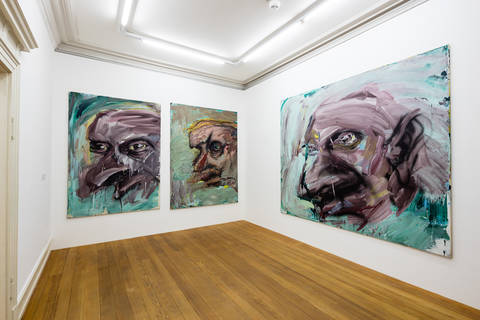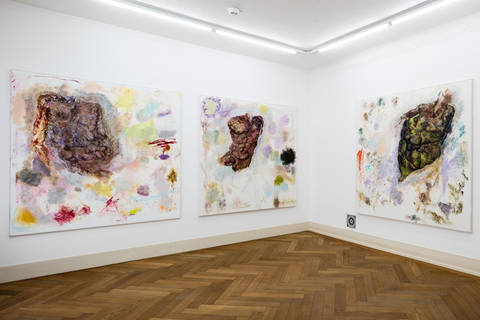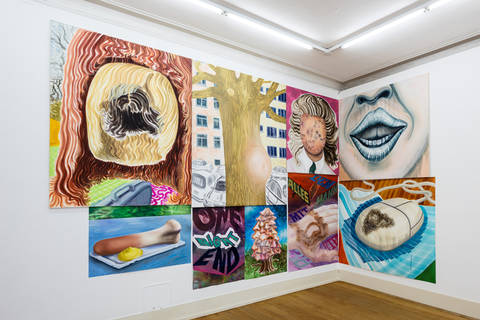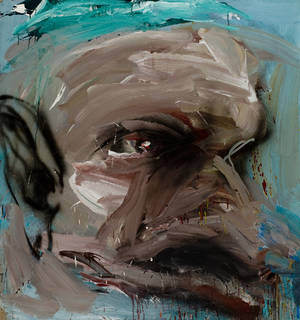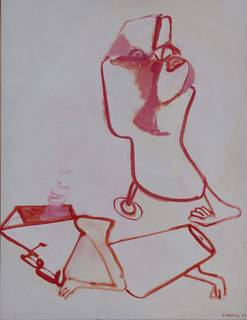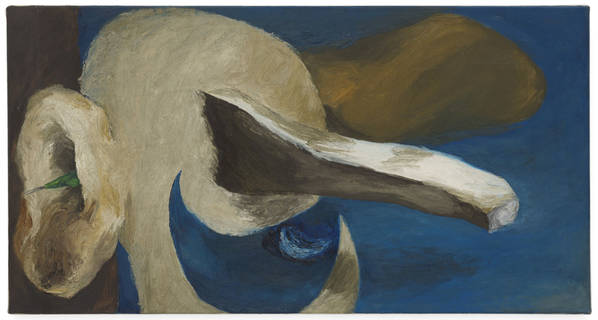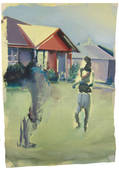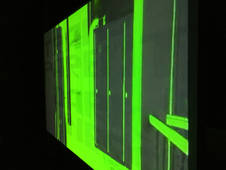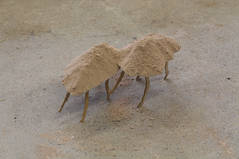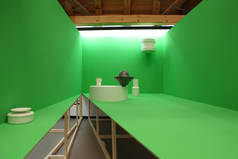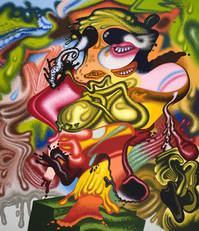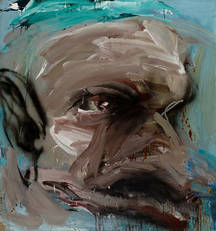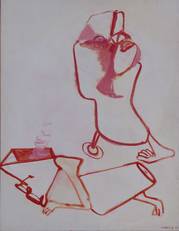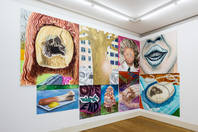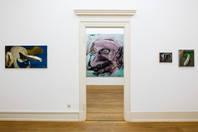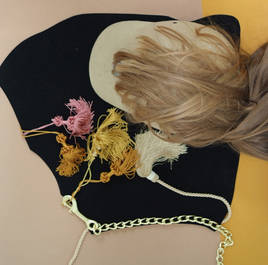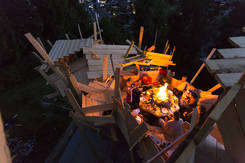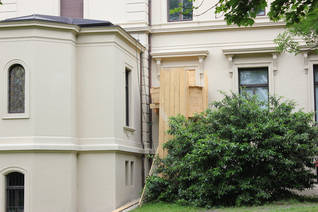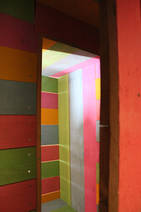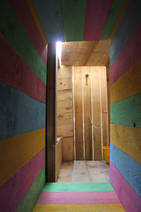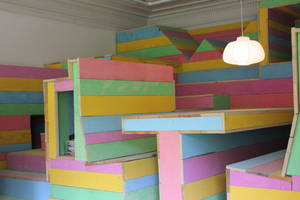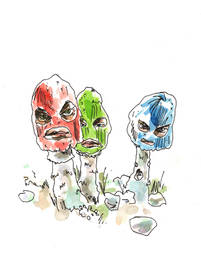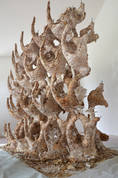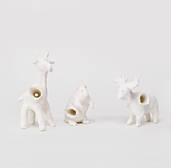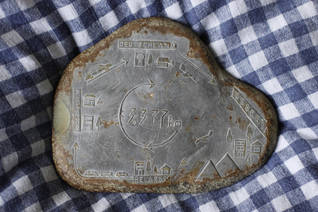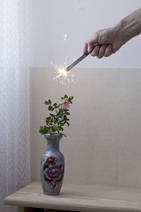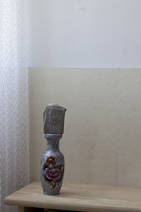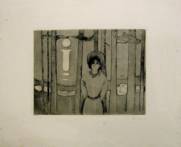28. November 2015 – 17. Januar 2016
Bahnwärterhaus:
Under Construction
Eröffnung: Freitag, 27. November, 19 Uhr
Valentino Biagio Berndt, Elsa Farbos, JAK, Alberto Zamora Ruiz
Under Construction ist eine zweiteilige Ausstellungsreihe, die das Bahnwärterhaus als Plattform für junge, internationale Künstler nutzt. Der Titel Under Construction steht für einen nicht abgeschlossenen Prozess. Die Arbeiten sind offene Konstruktionen, die weiter fortführbar sind.
Die ausgewählten Künstler verbindet, dass ihr Lebensmittelpunkt sich zur Zeit in der Region Stuttgart befindet. Der aktuelle Lebens- oder Studienort ist jedoch nur ein Teil der Gesamtkonstruktion. Verbindungen zu anderen, auch virtuellen Orten, Hinweise in die Zukunft und in die Vergangenheit öffnen sich durch die Arbeiten. Es zeichnen sich eigenwillige und sehr unterschiedliche Entwicklungen ab.
Vier Positionen bilden den Auftakt im ersten Teil der Reihe
Ein selbst entwickeltes Straßenfahrzeug von Valentino Biagio Berndt (*1988, Cuernavaca, Mexiko) erscheint wie der Prototyp für eine neue Trendsportart. Scheinbar mühelos bewegt sich das Gefährt zwischen realem und digitalem Raum.
Ebenso führen die Malereien von Alberto Zamora Ruiz (*1982, Mexico City) den Betrachter in die digitale Welt. Unterschiedliche Szenarien aus Internetmaterial verbinden sich zu einer neuen, offenen Erzählung. Wie die Skizzen eines Storyboards fügen sich die Bilder in einem größeren Kontext zu mehreren, immer wieder neuen Geschichten zusammen.
Die Einbettung in eine Wandmalerei wiederum könnte darauf verweisen, dass die Szenen nicht nur virtuelle Phänomene sind, sondern durchaus auch reale Hintergründe haben.
Die Differenzierung zwischen Realität und Virtualität wird hingegen von JAK gänzlich verweigert. Zwischen den Genren von Drehbuch, Film, Installation und Skulptur kann JAK nicht präzise festgelegt werden. Alle Inhalte drehen sich um JAK und alles wurde von JAK produziert. Es handelt sich nicht um eine Künstlerperson im herkömmlichen Sinne. Ein über mehrere Jahre angelegtes Spielfilmprojekt nimmt derzeit immer mehr Form an und ist Grundlage für die präsentierte Installation.
Schließlich basieren auch die Installationen von Elsa Farbos (*1987, Saint Germain en Laye, Frankreich) auf dem Nicht-Realen. Unter anderem formt sie aus Holz und Gips zarte Fantasiewesen, die wie erste Entwürfe für eine neue Spezies wirken. Das Volumen der Gipstierchen besteht aus aufgeschütteten pulverartigen Hügeln. Nichts ist endgültig festgelegt. Es bleibt offen, ob die Konstruktionsphase zu handfesten Ergebnissen führt oder ob alles eine anregende Illusion bleibt.
Der zweite Teil von Under Construction mit weiteren Positionen folgt vom 23. Januar bis 28. Februar 2016 im Bahnwärterhaus.
Kuratorin: Anka Wenzel
12 September – 15 November 2015
Better than de Kooning
Opening: 11 September, 7:00 p.m.
With works by Peter Saul, Lee Lozano, Maria Lassnig, Michel Majerus, Dieter Krieg, Tim Berresheim, Jana Euler, Katrin Plavčak, Jon Rafman, Gunter Reski, Matthias Schaufler, Jim Shaw, Amy Sillman, Sue Williams
The Villa Merkel, Galerien der Stadt Esslingen am Neckar, is presenting in the autumn of 2015 an extensive painting exhibition that directs its focus toward the depiction of distortions in the human image in postmodernism. The process of the de- and reconstruction of the naturalistic image of the human being was one of the major driving forces in the development of painting in the twentieth century and, in the framework of the digital era, is picking up speed once again. The title of the exhibition, Better than de Kooning, refers to the same-named work created in 2008 by the American artist Peter Saul who, with his concept of painting-appropriation, which is nourished both by Surrealism and Abstract Expressionism as well as by underground comics and political caricature, developed an innovative politpop painting style. The exhibition presents works by fourteen artists of European and American provenance over several generations who operate in terms of both form and contents between a conceptual reception of painting and an investigation of influences from the mass media.
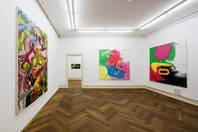
Installationsansicht Better than de Kooning, 2015<br/>von links nach rechts: Peter Saul, Better than de Kooning, 2008<br/>Courtesy David Nolan Gallery, New York<br/>Michel Majerus, Commercial Face of Contemporary Art 1, 1997<br/>Courtesy Privatsammlung, Berlin<br/>Michel Majerus, Commercial Face of Contemporary Art 4, 1997<br/>Courtesy neugerriemschneider Berlin<br/>Foto: die arge lola
At the same time, the exhibition will establish a bridge to caricature, comics and the animated films of the nineteenth and early twentieth centuries, and thereby illuminate the beginnings and interconnections of this thematic area.
Bringing together more than fifty paintings, the exhibition Better than de Kooning will extend over the entire upper floor of the Villa Merkel and retrace the interaction between painterly deformations of the human figure and mass-media images from 1961 to the present. The works on display will thereby enter into correspondence with an extensive wall collage consisting of caricatures, panels from comics and film stills.
Curators: Marcus Weber and Andreas Baur
Exhibition concept: Marcus Weber
A catalogue (German/English) with texts by Esther Leslie, Marcus Weber and Andreas Baur, as well as an interview of Peter Saul by Marcus Weber, will be published by Snoek Verlagsgesellschaft mbH, Cologne.
12. September 2015 – 15. November 2015
Jeanne Faust – 7 dealers
Opening: Friday, 11 September, 7pm
In her videos and photographs, Jeanne Faust plays with various perceptual levels of the viewer. The fundamentally narrational approach of her cineastic pictorial spaces initially gives rise to a supposedly familiar narrative structure which, however, is continuously disrupted. The fragments of image, text and action in her works are based on storyboards that she constructs herself and on carefully planned scenes that she realizes under her own direction.
Through the interplay between verbal, visual, literary and cineastic allusions, there is an interpenetration of concrete and imagined pictures that confront the viewer with a strangely familiar, but equally strange atmosphere. Jeanne Faust – 7 Dealers presents at the Villa Merkel in Esslingen three video installations along with photographs, a storyboard and further, extremely poetical works
27 June - 23 August 2015
Les Frères Chapuisat
Excrescence of Immortality
Interactive Construction Phase with Special Programs: from 21 May 2015
Opening: Friday 26 June, 7:00 p.m.
From a biological point of view, mushrooms are neither plants nor animals. They constitute their own third category. From time immemorial, they have been organisms with a mysterious aura, yet their existence is an everyday and indispensable occurrence in a flourishing ecosystem.
Les Frères Chapuisat have made an approach to the essence of mushrooms. Under the title Excrescence of Immortality, which refers to the primal power of these special organisms, Les Frères Chapuisat are appropriating the Villa Merkel. An architectural structure will spread throughout the ground floor of the Villa Merkel and serve as a living space for artists and fungi.
In its construction, this structure resembles the architecture of a monastery or a temple. Divided into social, contemplative and informative units, actual spatial structures are combined with narrative elements. This generates an independent organism into which the visitor is incorporated. An integrated library, a cinema and spaces of encounter provide insights into the significance and potentialities of the construction.
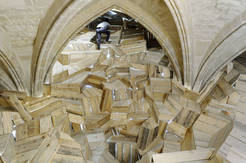
Les Frères Chapuisat<br/>Le Buisson Maudit, Abbaye de Maubuisson, Salle du chapitre, 2013<br/>© Conseil général du Val d’Oise. © Les Frères Chapuisat, Courtesy Galerie Mitterrand
The architectural constructions by Les Frères Chapuisat often involve space-encompassing and larger-than-life formations. The precise planning of apparently chaotic structures gives rise to works that operate along the border of technical feasibility.
The two brothers Gregory and Cyril from Geneva conceive of Les Frères Chapuisat as an open community. Their installations are realized with additional persons and in consideration of specific on-site conditions. In this sense, the time-consuming setting-up process is part of the life philosophy of Les Frères Chapuisat. In accordance with a nomadic principle, the artists live at the respective project sites and, if possible, inside the installations themselves. In an interactive construction phase, the ongoing process at the Villa Merkel will be opened to public view through regularly occurring programs.
Like an organic structure, this is an expanding principle that is open to external impulses. The process is accompanied by further artistic interventions.
Curator: Anka Wenzel
With the support of
![]()
27 June - 23 August 2015
Guest contributions on the upper floor
The exhibition “Excrescence of Immortality” functions like an organic structure that constantly grows further and is open to external impulses. The process is accordingly accompied by two additional, independent postions that take up the theme.
Stephan Henrich“The Fungus Project — On Robotic Gardeners and vertical Scrubs”
The architect Stephan Henrich created a living compound material out of oyster-mushroom mycelia and straw. With the help of a robotic gardener that he developed himself the natural organism is erected in a wall-like structure. The Fungus Project investigates reciprocal relationships between architecture, nature, human beings and robotic machines that can be used for supporting architectural processes. The Fungus Project was realized in the framework of a research fellowship at Schloss Solitude 2010/2011.
Heiko Sievers — Mushroom of the day
Day after day, a Small-format mushroom picture has been painted by the Berlin artist Heiko Sievers. At almost the same time, the pictures become visible in his blog. They sprout ceaselessly and form adigital cosmos in which references to current events, political affairs and private matters find a place and immediately begin to rot. The exhibition presents a selection of original drawings from what has grown to be more than 1,000 motifs. While on one day many small mushrooms combine in solidarity into occupy mushroom, on another day mushrooms sprout from the heads of politicians.
http://mushroom-of-the-day.blogspot.de/
Curator: Anka Wenzel
14 March – 17 May 2015
Hunters & Gatherers
In Contemporary Art
Opening: Friday, 13 March 2015, 7 pm
David Chancellor, Henry Coombes, Sinje Dillenkofer, Mark Dion, Daniel & Geo Fuchs, Christian Gonzenbach, Roderick Hietbrink, Carsten Höller, Christian Jankowski, Claus Kienle, William Lamson, Isa Melsheimer, Guy Oberson, Simona Pries, Glen Rubsamen, Erik Schmidt, Andreas Slominski, TINKEBELL, Francis Zeischegg
The days when we used to range through the wilds of the old world as hunter-gatherers looking for something edible are long gone. But is that chapter in the history of mankind really closed? Aren’t the hunting instinct and a passion for collecting still motors driving human deeds? How much of the ‘hunter-gatherer’ remains within us is a question asked by contemporary artists such as Christian Jankowski, who, in his video performance The Hunt, slays his prey with a bow and arrow in the supermarket.
Hunting and gathering – as two elementary cultural techniques, as two ways of approaching and appropriating nature – are still closely intertwined. As he hoards slayed animals as trophies, the hunter becomes a collector, and as the collector searches

David Chancellor<br/>Untitled Hunter # I, Trophy Room, Dallas, Texas, series Safari Club, 2011/12<br/>C-Print, 72,3 × 114,8 cm<br/>Courtesy David Chancellor / INSTITUTE
for rare pieces, he becomes a hunter. Each with their own unique perspective, the artists participating in this exhibition present unusual, moving, perspicacious and critical images of hunting and gathering.
The Merkelpark will also be turned into hunting grounds for the occasion. A hunting lodge (The Glutton) by the American artist Mark Dion stands in stark contrast to the idyll of the surrounding parkland. And Francis Zeischegg’s elevated hunting blind, constructed especially for the ‘Hunters and Gatherers’ exhibition project, offers visitors an unusual perspective.
This is a cooperative project with the Morsbroich Museum in Leverkusen, where the exhibition is shown from 21 September 2014 until 11 January 2015.
A catalogue with texts (German) by Markus Heinzelmann, Andreas Baur, Fritz Emslander, and Gabriele John is published at Wienand Verlag, Cologne.
Curator: Fritz Emslander
13 December 2014 – 22 February 2015
Mathieu Mercier
everything but the kitchen sink
Opening: Friday, 12 December 2014, 7 pm
Lamps, furniture, bicycles, letter presses, museum pedestals: Mathieu Mercier's artistic output moves back and forth in a masterly manner between the categories of art and everyday culture. Situated within the dynamic field of architecture, design, and the visual arts, it reflects upon the fundamental ideas of Western culture in the twentieth century, especially the concept of Modernism.
Again and again, he refers back to the artistic avant-garde, to heroes such as Marcel Duchamp or Piet Mondrian, and establishes connections with their gestures and pictorial inventions by means of deliberate displacements of apparently ordinary objects from the contemporary world. In a permanent exchange between high and low, Mercier enigmatically poses the question as to the status of objects
oscillating between functionality and artistic freedom from practical utilization when, for example, he takes pipes intended for construction purposes and converts them into benches, or transforms sporting equipment into monstrous light fixtures.
The solo exhibition of the artist Mathieu Mercier, who was born in 1970 and lives in Paris, is being developed in collaboration with the Kunstmuseum St. Gallen. It will be viewed in Esslingen as the second station immediately after its presentation at the Kunstmuseum St. Gallen.
The two institutions will be jointly issuing a catalogue.
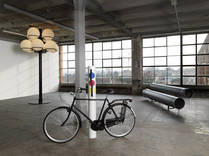
Mathieu Mercier<br/>Exhibition view „Sublimations“, Centre d’art contemporain d’Ivry – le Crédac 2012<br/>Courtesy Mathieu Mercier<br/>Photo: André Morin

Mathieu Mercier<br/>o.T. (Watch/Tunnel), 2012<br/>Watch, pedestalled on Corian, 90 x 60 x 60 cm<br/>Courtesy Mathieu Mercier<br/>Photo: Aurélien Mole / Fondation d’entreprise Ricard
12 October 2014 – 11 January 2015
Obsessions and Surreal Worlds
Works from the Prints Collection of the City of Esslingen am Neckar
Bahnwärterhaus
Opening: Sunday, 12 October 2014, 11 am
Bringing the subconscious onto paper and designing ambiguous, surreal pictorial worlds: The Galleries of the City of Esslingen present in the Bahnwärterhaus a cross-section of drawings, prints, and photographs from the Prints Collection of the City of Esslingen am Neckar. Right up to today, the artistic investigation of reality sometimes crosses over into the realm of the surreal or the obsessive.
The exhibition probes the fantastical worlds situated between reality and dream. Whether irrational or mystical, obsessive or dreamy, neurotic or provocative—the artistic attitudes are due to pointed approaches. Works from the twentieth century, e.g. by Hans Bellmer, Lovis Corinth or Wols, come into relation with current positions of international contemporary art such as those of Damien Deroubaix, Michael Bauer, or Melanie Smith.
The range of artistic languages extends from the uncanniness of true-to-life situations all the way to obsessive distortions of human impressions.
In particular, the acquisitions from recent years provide the show with unexpected insights into the municipal Prints Collection. Unknown treasures of the 20th and 21st centuries from the Prints Collection come to light. The exhibition continues a series of presentations from the collection such as “Volker Böhringer: Industriegrafiken” (2006), “Das alles auf Papier!” (2007), “kein licht für wen” (2008), and “Heribert Friedland. Tuschen und Aquarell im Dialog mit Werken der Graphischen Sammlung der Stadt Esslingen am Neckar” (2008).
Curated by Andreas Baur and Tina Plokarz

Sarah Jones<br/>The Bedroom, 2002<br/>C-Type-Print on aluminium, 130 x 170 cm<br/>Graphische Sammlung der Stadt Esslingen am Neckar

Meret Oppenheim<br/>Steine - Schwarze Tropfen, 1974<br/>Etching on 250g Arches paper, 66 x 50 cm<br/>Graphische Sammlung der Stadt Esslingen am Neckar

